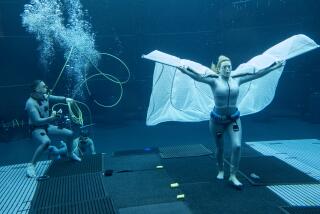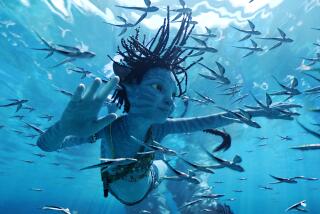The young wards of a Communist state
- Share via
“The Great Water” is an unusually ambitious film from a country not ordinarily thought of as a filmmaking center. Even when it falters, it fascinates with how much it is trying to accomplish.
“The Great Water” comes from Macedonia, one of the countries that made up the former Yugoslavia. Though an earlier Macedonian effort, 1994’s “Before the Rain,” was nominated for the best foreign language Oscar, production from this particular remnant has not been frequent.
Like Bosnia, Croatia, Serbia and its other ex-Yugoslavian neighbors, Macedonia is a country struggling to come to terms with its past, trying to tell cinematic stories that illuminate issues and circumstances that still bedevil it.
The period “The Great Water” deals with is a specific and potent one: the brief years just after the Second World War, when Marshal Tito tried to turn Yugoslavia into a rigid Soviet state before finally breaking with Stalin and loosening the reins a bit.
As directed by Ivo Trajkov and photographed and co-produced by Suki Medencevic, this film mixes artistic adventurousness with political reexamination. It’s a realistic parable told with some of the surreal sensibility that marks the work of fellow former Yugoslavian Emir Kusturica, a film that’s unafraid of examining power with dreamlike means.
“The Great Water” introduces us to prominent Macedonian politician Lem Nikodinoski (Meto Jovanovski) as he is being rushed to the hospital after suffering a heart attack. As he fights for his life, Lem flashes back to his childhood self (played by Saso Kekenovski) and the time he spent in an orphanage in summer 1945.
As run by the bluff Ariton (Mitko Apostolovski) and his comely second in command, Olivera (Verica Nedeska), this former factory was actually more of an indoctrination center intent on turning children of enemies of the state into zealous young Communist Pioneers.
The camp is initially presented as a chaotic, sadistic place. Young Lem is treated abysmally and tries to find his footing among adults, notably Olivera, who worship Stalin with an uncomfortable obsessiveness and insist that even children engage in the kind of self-criticism reminiscent of the Moscow show trials.
Everything changes, however, when the slightly older Isak (Maja Stankovska) is brought to the camp. Unruffled, charismatic, untouched by the horrors that surround him, Isak comes across as a strange combination of devil, Christian saint and model citizen. His allegorical presence changes everything about the camp and about Lem’s life there.
Intent as it is on being both artistically and politically involving, “The Great Water” periodically miscalculates its effects, coming on stronger than it intends.
The film’s work with child actors is especially good (thanks to Mykola Heyko, the acting coach who worked on “Kolya”), but its decision to have old Lem read his extensive voice-over in English feels like a commercial rather than an aesthetic choice. Still, you leave this film intrigued by its aspiration and not likely to forget the world it’s introduced you to.
*
‘The Great Water’
No MPAA rating
Times guidelines: Intense subject matter, brief sexual activity, the off-screen electrocution of a cat.
Released by Picture This! Entertainment. Director Ivo Trajkov. Producers Mile Arsovski, Vladimir Chrenovsky, Robert Jazadziski, Suki Medencevic, Ivo Trajkov. Screenplay Vladimir Blazevski, based on the novel by Zhivko Chingo. Cinematographer Suki Medencevic. Editor Atanas Georgiev. Costumes Zaklina Krstevska. Music Kiril Dzajkovski. Production design Kemal Hrustanovic. Art directors Natasha Dimitrievska, Kiril Spaseski. Set decorator Natasha Dimitrievska. Running time: 1 hour, 30 minutes.
Playing at Laemmle’s Fairfax.
More to Read
Only good movies
Get the Indie Focus newsletter, Mark Olsen's weekly guide to the world of cinema.
You may occasionally receive promotional content from the Los Angeles Times.











